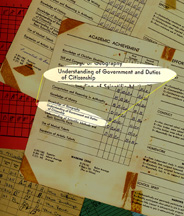 Purdue News
Purdue News
 Purdue News
Purdue News

|
The Ackerman Center at Purdue is the only citizenship center in the nation to be established with a private gift, according to Lynn Nelson, its director. He says its mission is to assume a national leadership role in creating knowledgeable, responsible citizens. The center educates teachers on how to implement citizenship programs in their classrooms. Students in the School of Education at Purdue also have access to special programs offered by the center.
The Center for Civic Education has been supported by the U.S. Department of Education to develop the National Standards for Civics and Government and to assist in the development of the forthcoming National Assessment of Educational Progress in civics and government.
The center, directed by Charles Quigley, also offers the nationwide program "We The People ... the Citizen and the Constitution." Students involved in that program participate in competitions on the Bill of Rights and the Constitution.
Nelson and Quigley agree with Clinton that it's time for schools to re-emphasize citizenship.
By not giving citizenship its due in the classroom, Nelson says, we are validating the increasing apathy among today's young people. "We must stop defining the outcomes of education so narrowly," he says. "Society emphasizes that the purpose of education is to get a job, rather than to learn how to live a meaningful life."
Nelson defines "citizenship" as participation in society, government, and voluntary and civic organizations. He says voting is important, but it is just one aspect of good citizenship. Nelson says students need to have a knowledge of history and a clear understanding of the political system, and they need to learn how to treat one another as people, rather than objects. If not, he says, society will continue to grow more fragmented.
"Part of the problem is the confusion between democracy as an ideal and democracy as practiced by politicians," Nelson says. "Students in a civics class should not only learn about their rights as citizens, but also about their responsibilities."
Nelson acknowledges that values, character and citizenship are being taught indirectly in public schools -- through children's stories in the primary grades and through literature, history and civics in the secondary grades.
"But civics and government are electives rather than required courses in many schools," Nelson says. "It's time for history, civics and the social sciences to claim their place in the curriculum."
Quigley agrees. "There is low voter turnout, hostility toward government and politicians, and an overall low governmental approval rating," he says. "This is at least partially due to widespread ignorance about the government, how it works and how to monitor and influence it."
Quigley points to three over-arching functions of the education system in this country: to help people learn how to support themselves, to help them learn how to take part in governing themselves, and to enhance their lives with knowledge. He says the United States doesn't always make the grade on the latter two.
Teaching citizenship in schools hasn't always been taboo. Nelson says report cards used to include letter grades and marks for citizenship, conduct and participation in school activities.
"Public schools began phasing out the teaching and evaluation of citizenship in the late 1950s as a response to parents who wanted a vocation taught at school, values taught at home." he says. "The only pocket of education teaching citizenship on a regular basis is the private school system."
Nelson and Quigley say they are hopeful because the subject of citizenship is drawing national attention from the top. For instance, Congress in 1994 mandated the development of national standards for civics and government.
"For the first time, the subjects of civics and government took their place among math, English and science in a piece of legislation -- the 'Goals 2000 -- Educate America Act', " Quigley says.
And both agree that it's the teachers and their education that will make the biggest difference.
"Teaching the meaning of citizenship is much more than the transmission of content," Nelson says. "It's teaching our young people to live a life as well as make a living."
Sources: Lynn Nelson, (765) 494-4755; e-mail, lrnelson@omni.cc.purdue.edu
Charles Quigley, (818) 591-9321
Writer: Kate Walker, (765) 404-2073; e-mail kate_walker@purdue.edu
Purdue News Service: (765) 494-2096; e-mail, purduenews@purdue.edu
Photo caption:
All these report cards from the 1960s and '70s included grades for citizenship. The
highlighted section is from a 1963 report card.
Color photo, electronic transmission, and Web and ftp download available. Photo ID:
Nelson/Citizenship
Download here